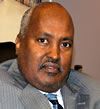 by Mohamed Abdi Mohamed
by Mohamed Abdi Mohamed
Wednesday, June 19, 2013
It is indeed a sad day when one discovers that brothers from the same household indulge in suspicious behavior that, unless checked, can lead to the destabilization of the home.
I refer to the visit of brothers from Puntland who made a visit to Kenya recently. They were afforded the opportunity to meet with the Foreign Secretary of Kenya Ms. Amina Mohamed. They were also granted an audience with the newly elected President of Kenya. It is known that the leadership in Puntland fully supports the developments currently taking place in Jubbaland in direct opposition to the Federal Government. This visit has caused many Somalis to wonder about the nature of this visit.
It is perceived that there are several forces that are in play.
First, it is generally accepted that the political forces within Puntland do not support the position of the Federal Government with regards to Jubbaland. Their support serves the purpose of undermining the position of the Federal Government and provides moral and other support to the self-proclaimed government in Jubbaland.
Second, the Government in Kenya while indulging in a shrewd political and diplomatic dance with the Federal Government of Somalia seems to support a Kenya friendly autonomous region of Jubbaland. These facts serve a singular conclusion that these semi-autonomous regions are not prepared to accept the existence of a Central Federal Government in Mogadishu. This predisposition combined with the political reality in Somaliland raises the serious question as to whether federalism within the borders of a Nation called Somalia is merely a pipe dream or whether it is a practical possibility.
Third, it raises the question as to whether Somalia can exist as a nation without the support of Kenya and Ethiopia (both with a combined population of over 110 million). Current evidence seems to suggest that neither nation is prepared to surrender its capacity to weaken the foundations of the Mogadishu based Federal Government. Under the umbrella of IGAD, Somalia is often perceived to be under “Colonial Rule” administered by IGAD. It is an affront to the dignity of the people of Somalia. The expanding role of IGAD is a matter of great concern and intrigue. The broader international community may not fully understand that in Kenya, Ethiopia and Djibouti there are sizeable ethnic Somali communities that still maintain their original Clan affiliations with Somalis living in Somalia. As the impetus for regional self -autonomy grows within Somalia; there is some suspicion that cross border clan affiliations may be having some influence on IGAD.
Fourth, the world was led to believe that AMISOM was created to defeat and rid Somalia of Al Shabaab and its links to Al Qaeda. It was never anticipated that any of the nations that are contributing troops to AMISOM would indulge in political interference in the internal affairs of Somalia.
Fifth, recent political advances made by Egypt (which has been making bellicose noises against Ethiopia) towards Somalia seem to raise the stakes for widening conflict within the region.
Once again the Cloud of a balkanized Somalia grows darker. One can reasonably conclude that Somalis are engaged in a process of self-implosion. The simple irony is that the vast majority of Somalis are desirous of maintaining their SOMALI identity as distinct from being Kenyan or Ethiopian. All Somalis are bound by a common language, a common religion and culture. They are however divided by Clan and irrespective of educational levels, seem incapable of avoiding Sectarian Myopia. Are Somalis really willing to sacrifice their common identity and become mere pawns of their larger neighbors?
This leads all reasonable observers to conclude that there can only be sensible path going forward. There needs to be a SOMALI “Peace and Reconciliation Process” convened in several areas of Somalia , without any input from IGAD, or any regional entity, chaired by the United Nations (acceptable to all parties in Somalis) to arrive at a national consensus. Somalia needs an honest broker to divert from the present path that leads to the destruction of Somali as a country.
However, it does not mean that the broader international community does not have a critical role in the reconstruction of Somalia; on the contrary, the broader international community is needed to broker a workable consensus among the splintered groups and sub-groups that comprise Somalia. It is of vital importance that the international community does not see Somalia as “an African Problem in the horn of Africa” and that Somalia is not critical to the national interest of other nations. Somalia must never be allowed to be an incubator for extremism in this part of the world.
In conclusion, the current Federal Government faces serious challenges as to how it is perceived within Somalia. Ministers of the Government need to understand and behave in a manner that represents the Federal nature of the Government and work diligently to dispel the notion that the Federal Government is a Government of and for Mogadishu. The Government would be well served by articulating its domestic agenda and how the Government intends to address these issues including its relationship with the various regions. Forging consensus and emphasizing common ground is perhaps the most urgent challenge facing the Federal Government.
Mohamed Abdi Mohamed
[email protected]
Washington DC